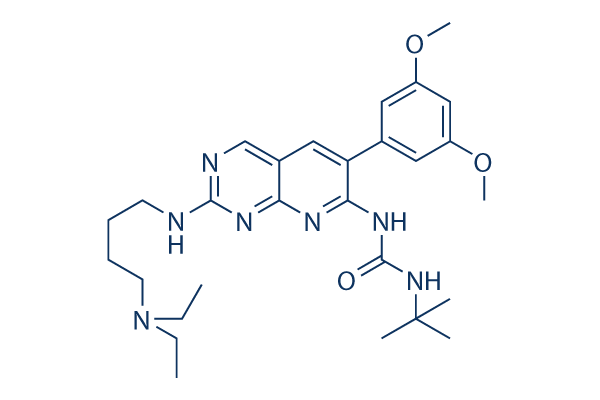six 58. 3% from controls to AZA197 treated tumors. Western blotting of isolated tumor tissue indicated that AZA197 therapy doesn’t alter Cdc42 and total PAK and ERK expression. Phospho PAK1 ex pression in tumors treated with AZA197 was signifi cantly lowered by 48. 5 11. 4% when compared with untreated controls. Similarly, in tumors treated with AZA197, phospho ERK levels decreased drastically by 59. two 17. 1% in comparison to untreated controls. These information show that the PAK ERK signaling pathway can be a downstream target in the modest molecule inhibitor AZA197 in SW620 colon cancer tissue confirming our findings in vitro. In mice bearing colon cancer xenografts, the median time for you to death within the manage group was 53 days and all mice died in between 45 and 92 days following tumor cell graft ing.
On the other hand, survival was drastically increased in mice following AZA197 remedy compared to handle mice and the median time for you to death was 69 days. On day one hundred, all animals within the manage group had been deceased whereas 50% of selleck chemicals AZA197 treated mice have been nonetheless alive. Control mice that died on days 45, 57 and 58 had tumor weights of 3455, 4582 and 4810 mg, respectively, whereas mice inside the AZA197 remedy group at com parable time points at days 47 and 64 had tumors of 2897 and 3768 mg, respectively, showing that AZA197 treatment results in decreased tumor weight even selelck kinase inhibitor soon after the finish of treatment on day 22. Together, these data indicate that AZA197 slows principal tumor growth of human SW620 colon cancer xenografts in mice and improves animal survival.
Discussion Important progress has been achieved in deciphering the molecular events linked together with the onset of colorectal cancer and molecular analyses are becoming mainstream in preparing the management of advanced colorectal cancer with tailored therapies. Even though new, targeted therapies have come to be readily available in current years,  some sufferers are resistant for the clinical rewards of these agents which have only a modest influence on disease. In sophisticated colorectal cancer individuals with mutated KRAS, by way of example, targeted therapies have offered no advantage displaying a clear need to establish new therapeutic strat egies. Despite the fact that a recent study has shown that a sturdy lower in Cdc42 and Rac1 activity in mixture with ROCK inhibition is clearly associated with enhanced colon cancer invasiveness, information from preceding stud ies addressing the molecular mechanisms underlying colon cancer progression suggested that Rho members of the family like Cdc42 may possibly play a crucial part in promoting colon cancer progression. Cdc42 is more than expressed within a number of human cancers and may well be involved within the promotion of tumorigenesis and Cdc42 activity has been implicated within the invasive phenotype which characterizes tumor metastasis.
some sufferers are resistant for the clinical rewards of these agents which have only a modest influence on disease. In sophisticated colorectal cancer individuals with mutated KRAS, by way of example, targeted therapies have offered no advantage displaying a clear need to establish new therapeutic strat egies. Despite the fact that a recent study has shown that a sturdy lower in Cdc42 and Rac1 activity in mixture with ROCK inhibition is clearly associated with enhanced colon cancer invasiveness, information from preceding stud ies addressing the molecular mechanisms underlying colon cancer progression suggested that Rho members of the family like Cdc42 may possibly play a crucial part in promoting colon cancer progression. Cdc42 is more than expressed within a number of human cancers and may well be involved within the promotion of tumorigenesis and Cdc42 activity has been implicated within the invasive phenotype which characterizes tumor metastasis.
Met Receptor Signal
Cancer stem cells are thought to hijack the ability of normal stem cells to express MET.
